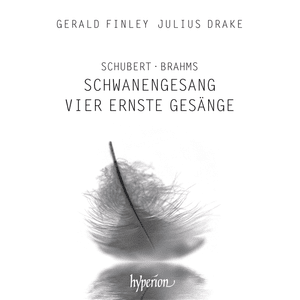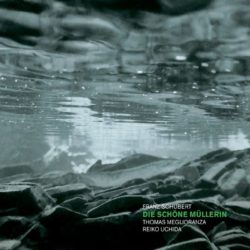Classical CD Reviews: Finley & Drake’s “Schwanengesang,” Bostridge & Adès’ “Winterreise,” Meglioranza & Uchida’s “Die schöne Müllerin”
By Jonathan Blumhofer
Reviews of three superior vocal recordings, featuring baritone Gerald Finley, tenor Ian Bostridge, and baritone Thomas Meglioranza.
 If you’re most familiar with the Canadian baritone Gerald Finley as one of the most charismatic opera singers of the day, it won’t surprise you that he’s a particularly affecting lieder singer, too. His new recording of Schubert’s Schwanengesang (coupled with Brahms’s Vier ernste Gesänge) showcases Finley at his best, with beautiful, supremely characterful singing, song-to-song.
If you’re most familiar with the Canadian baritone Gerald Finley as one of the most charismatic opera singers of the day, it won’t surprise you that he’s a particularly affecting lieder singer, too. His new recording of Schubert’s Schwanengesang (coupled with Brahms’s Vier ernste Gesänge) showcases Finley at his best, with beautiful, supremely characterful singing, song-to-song.
The former quality is, here, simply amazing. Suffice it to say, Finley sings with a warmth of tone that’s all-enveloping: smooth, golden, focused, consoling. Add to that his rhythmic exactitude, intensity of tone, and spotless diction, and you’ve got some of the finest, most deeply-felt Schubert from a baritone this side of Thomas Quasthoff.
As far as the interpretive approach to these songs goes, Finley and pianist Julius Drake emphasize the music’s resigned, elegiac tone. Tempos lean towards expansiveness, though this is by no means a sluggish survey of these lieder. Quite the opposite: “Frühlingssensucht” drives smartly while the “Abschied” is positively jaunty.
At the same time, theirs is an exquisitely melancholy “Liebesbotschaft”; “Kriegers Ahnung” and “Aufenthalt” are shaped with sobering forcefulness; “Der Atlas,” “Ihr Bild,” and “Die Stadt” come across with potent direction; and baritone & pianist deliver a fearsome, concluding “Der Doppelgänger.”
A similar concentration marks the pair’s traversal of the Brahms, a setting of four “non-dogmatic” biblical texts that primarily focus on suffering. These are smartly-crafted readings: just listen to how the lyrical second subject of “Ich wandte mich” is phrased or how Finley imbues the concluding “Wenn ich mit Menschen- und mit Engelzungen redete” with shining nobility.
In all, it’s a potent disc, grandly sung, played, and recorded – and fully worthy of a spot in the pantheon with the likes of Hotter, Fischer-Dieskau, Goerne, and Quasthoff.
 Tenor Ian Bostridge and pianist/composer Thomas Adès are two of the most intelligent and probing musicians of the last couple of decades. Anything the pair of them do together is worth keeping an eye on; their new account of Schubert’s bleak song cycle Winterreise is a case-in-point.
Tenor Ian Bostridge and pianist/composer Thomas Adès are two of the most intelligent and probing musicians of the last couple of decades. Anything the pair of them do together is worth keeping an eye on; their new account of Schubert’s bleak song cycle Winterreise is a case-in-point.
From the vocal angle, this is a Winterreise of precise rhythm and diction, but also of personality and tonal subtlety. Listen, for instance, to the delicate vocal shadings Bostridge brings to the minor- and major-mode sections of “Rückblick.” Or the harrowing intensity with which he sings “Wasserflut.” Or the devastating vulnerability displayed in “Rast” and “Frühlingstraum.” It’s not always singing of the lushest beauty (there’s a raw moment or two in “Rast,” for instance) — but that’s the point: the expressive heart of these songs is the goal, and Bostridge gets to that with sometimes terrifying immediacy.
Adès provides an accompaniment (if that’s the right word) of uncanny clarity and direction. Perhaps unsurprisingly, there isn’t a hint of sentimentality in his playing. Rather, he provides spades of color, delicious balances (both between the voice and keyboard, and within the piano part), rhythmic precision, and a strong sense of character in each number. The results are haunting and compelling: look no further than “Die Krähe” – or, really, the opening “Gute Nacht” – to hear what I mean.
As with all Schubert, there’s plenty of recorded competition for Winterreise. For my money, this disc holds its own with the best of the classics for sheer force of personality and passion. Like all Pentatone releases, it’s also flawlessly engineered.
 Thomas Meglioranza is one of the Boston-area’s finest baritones. His new account of Die schöne Müllerin with pianist Reiko Uchida – the duo’s third Schubert album — is warmly sung, impressively enunciated, and, on the whole, quite lively.
Thomas Meglioranza is one of the Boston-area’s finest baritones. His new account of Die schöne Müllerin with pianist Reiko Uchida – the duo’s third Schubert album — is warmly sung, impressively enunciated, and, on the whole, quite lively.
Meglioranza’s diction and intonation are faultless throughout and his accounts of the opening lieder brim with energy and spirit. As the song cycle progresses and the narrative darkens, his interpretation becomes appropriately grimmer and more forlorn, though glimmers of the earlier tone remain in “Der Müller und der Bach,” among others.
Uchida, playing an 1829 fortepiano, delivers an accompaniment that’s clean-toned and rhythmically incisive (her “Am Feierabend” is conspicuously vigorous). At the same time, there’s a glowing warmth to her playing in the lyrical songs: “Der Neugeirige,” “Tränenregen,” “Die liebe Farbe,” and “Des Baches Wiegenlied” sing with bold fervency.
The pair’s is, in the end, a deeply-felt and touching reading of this familiar set of songs. For beauty of tone and sincerity of interpretation, they won’t lead you astray.
Jonathan Blumhofer is a composer and violist who has been active in the greater Boston area since 2004. His music has received numerous awards and been performed by various ensembles, including the American Composers Orchestra, Kiev Philharmonic, Camerata Chicago, Xanthos Ensemble, and Juventas New Music Group. Since receiving his doctorate from Boston University in 2010, Jon has taught at Clark University, Worcester Polytechnic Institute, and online for the University of Phoenix, in addition to writing music criticism for the Worcester Telegram & Gazette.
Tagged: CD Baby, Gerald Finley, Hyperion, Ian Bostridge, Julius Drake, Pentatone, Reiko Uchida, Thomas Ades, Thomas Meglioranza

